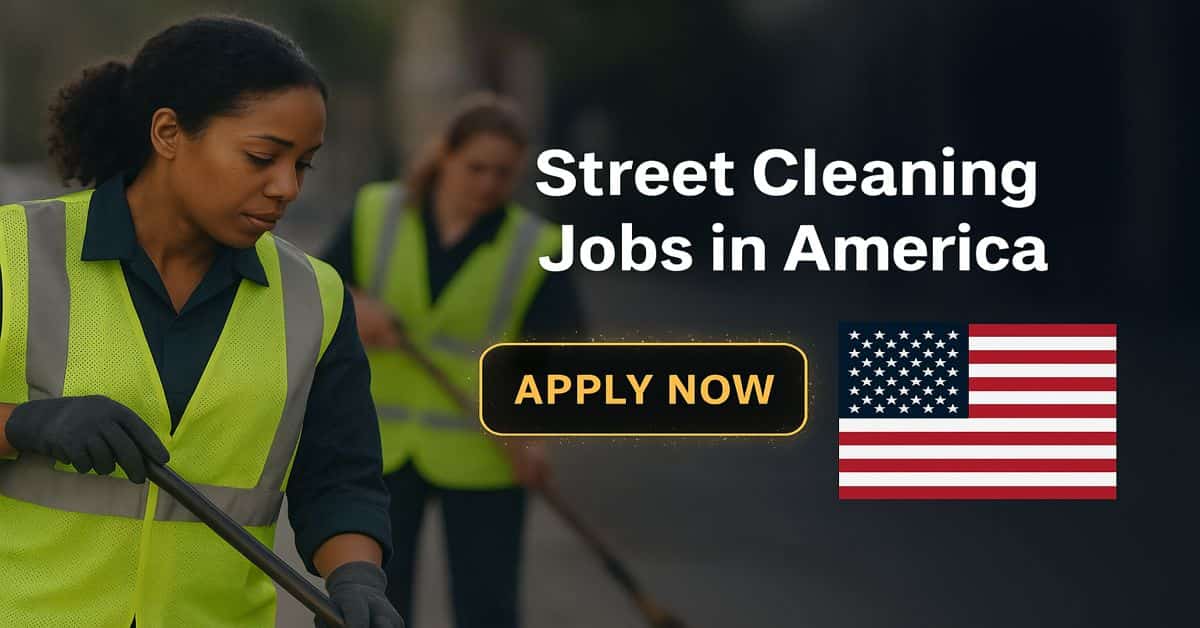Street cleaning jobs in America offer reliable full-time, physical work with steady pay that ranges from $32,000 to $48,000 annually in 2025. While these roles aren’t remote and require being outdoors in all seasons, they provide dependable hours, overtime opportunities, and benefits such as healthcare and retirement plans.
Experience isn’t always required, making it a welcoming path for people seeking stability, fresh starts, or careers that allow them to give back to their community.
Why Street Cleaning Jobs Matter in 2025:
From bustling downtowns to suburban neighborhoods, street cleaning ensures public health, prevents pollution, and supports tourism. With more U.S. cities focusing on sustainability and eco-friendly urban living, the role of street cleaners has become more important than ever.
Job Responsibilities:
Street cleaning jobs vary depending on the city or state, but most positions include:
- Operating street-sweeping vehicles
- Clearing litter, leaves, and debris from roads and sidewalks
- Using hand tools and power washers for detailed cleaning
- Reporting hazards such as potholes or illegal dumping
Many jobs also involve flexible shifts, including early mornings or evenings, making them a good fit for those who prefer non-traditional work hours.
Salary:
In 2025, the average salary for street cleaners in America ranges from $32,000 to $48,000 annually, depending on location, union membership, and experience. Metropolitan areas like New York, Los Angeles, and Chicago often offer higher pay.

Job Outlook:
The Bureau of Labor Statistics projects steady demand for street cleaning roles through 2030, with many cities increasing their sanitation budgets. Seasonal peaks such as fall leaf cleanup and post-storm recovery also drive temporary and overtime opportunities.
Benefits:
- Steady Income – With salaries ranging from $32,000 to $48,000 a year, street cleaning jobs offer reliable pay and overtime opportunities.
- Job Security – Demand for sanitation workers continues to grow as cities expand and environmental regulations tighten.
- Health & Retirement Benefits – Many city or union positions include medical, dental, retirement plans, and paid time off.
- Career Growth – Entry-level workers can move into supervisory, operations, or city management roles over time.
- Flexible Shifts – Early morning, evening, and overnight options allow workers to balance personal commitments.
- Community Impact – Street cleaners help create cleaner, safer, and more welcoming neighborhoods, making the work meaningful.
- No Advanced Degree Required – Most jobs require only a driver’s license and physical fitness, making this career accessible to many.
- Union Support – In unionized cities, workers often receive stronger protections, better pay, and collective bargaining advantages.
How to Apply for Street Cleaning Jobs in America?
Interested candidates can find openings through:
- City government websites
- Union job boards
- Job platforms like Indeed, Glassdoor, and ZipRecruiter
- Local sanitation departments
Most positions require a valid driver’s license, physical fitness for outdoor work, and in some cases, a commercial driver’s license (CDL).
Conclusion:
Street cleaning jobs in America provide steady pay, essential benefits, and opportunities for growth without requiring advanced experience. In 2025, these roles remain vital for keeping cities safe, sustainable, and welcoming. For anyone seeking stability and purpose, street cleaning offers a career with lasting value.
Frequently Asked Questions:
-
What is the average salary for street cleaning jobs in 2025?
Street cleaners in the U.S. earn between $32,000 and $48,000 annually, with higher pay available in big cities like New York, Los Angeles, and Chicago.
-
Are street cleaning jobs remote or physical?
These jobs are entirely physical and outdoor-based, involving tasks like operating sweepers, clearing litter, and maintaining sidewalks and roads.
-
Do I need previous experience to become a street cleaner?
Not always. Many cities hire entry-level candidates and provide on-the-job training, though having a valid driver’s license or CDL can give you an advantage.






